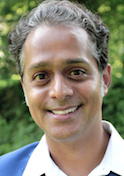Contribute
| Rahul Sarpeshkar Of Dartmouth Univ. Honored By IEEE |
Press Release
12/14/2017
The Institute of Electrical and Electronics Engineers Nov. 28 announced its latest elevated Fellows with numerous Indian American and South Asian origin engineers among those honored. The Indian and South Asian origin engineers are based in the U.S., with others residing in Mumbai, Chennai, Hong Kong, New Zealand, Singapore and Australia. The IEEE Fellow distinction is reserved for select members who exhibit an extraordinary record of accomplishments in any of the IEEE fields of interest, which include aerospace systems, biomedical engineering, computing, consumer electronics, energy, telecommunications and more. Swaroop Darbha of Texas A&M University in College Station, Texas, was chosen for contributions to intelligent transportation systems and autonomous vehicles. Jaydev Desai of the Georgia Institute of Technology in Atlanta was selected for contributions to medical and swarm robotics. Saibal Mukhopadhyay, also of Georgia Tech, was selected for contributions to energy-efficient and robust computing systems design. Redmond, Wash.-based Alstom Grid Inc.’s Anil Jampala was selected for contributions to the utilization of synchrophasors in energy management systems. Somesh Jha of the University of Wisconsin at Madison was chosen for contributions to the application of formal methods to security. Jignesh Patel, also from UW-Madison, was selected for contributions to high-performance spatial data analysis methods. Sanu Mathew of Hillsboro, Ore.-based Intel Corp. was picked for leadership in computer arithmetic datapath and security circuits. Deepankar Medhi of the University of Missouri at Kansas City was among the Fellows chosen for contributions to optimization and the design of computer-communication networks. C.J. Reddy of Hampton, Va.-based Altair Engineering Inc. was chosen for leadership in simulation methods for antenna placement and co-site analysis. Badrinath Roysam of the University of Houston was selected for contributions to image processing algorithms for biological microscopy. Dearborn, Mich.-based Ford Motor Company’s Vijay Anand Sankaran was chosen for leadership in power electronics and energy storage for electric vehicles. Rahul Sarpeshkar of Hanover, N.H.-based Thayer School of Engineering at Dartmouth was picked for contributions to ultralow-power biomedical electronics. Sanjit Seshia of U.C. Berkeley was selected for contributions to formal methods for inductive synthesis and algorithmic verification. Siddhartha Srinivasa of the University of Washington was selected for contributions to robotic manipulation and human-robot interaction. Rounding out the U.S.-based engineers honored was Mountain View, Calif.-based Google Inc.’s Rahul Sukthankar, who was chosen for contributions to video classification. Global engineers of Indian and South Asian origin include Bijnan Bandyopadhyay of IIT Bombay, chosen for contributions to discrete-time, multi-rate, output feedback sliding-mode control; as well as Shanthi Pavan of the Indian Institute of Technology in Chennai for contributions to delta sigma modulators and analog filters. Girish Nair of the University of Melbourne in Victoria, Australia, was chosen for contributions to control and information in networked dynamical systems. Chandra Nair of the Chinese University of Hong Kong was picked for contributions to network information theory. Ajay Kumar of Hong Kong Polytechnic University was selected for contributions to non-contact hand-based biometrics recognition. Udaya Madawala of the University of Auckland in New Zealand was honored for contributions to power electronics for bi-directional wireless power transfer. And Mehul Motani of the National University of Singapore was picked for contributions to wireless communications and sensor networks. Nominated by peers and conferred by the IEEE Board of Directors, IEEE Fellowship is considered both a prestigious honor and a noteworthy career achievement within the technical community. The total number selected in any one year does not exceed one-tenth of one percent of the Institute’s total voting membership.
You may also access this article through our web-site http://www.lokvani.com/
